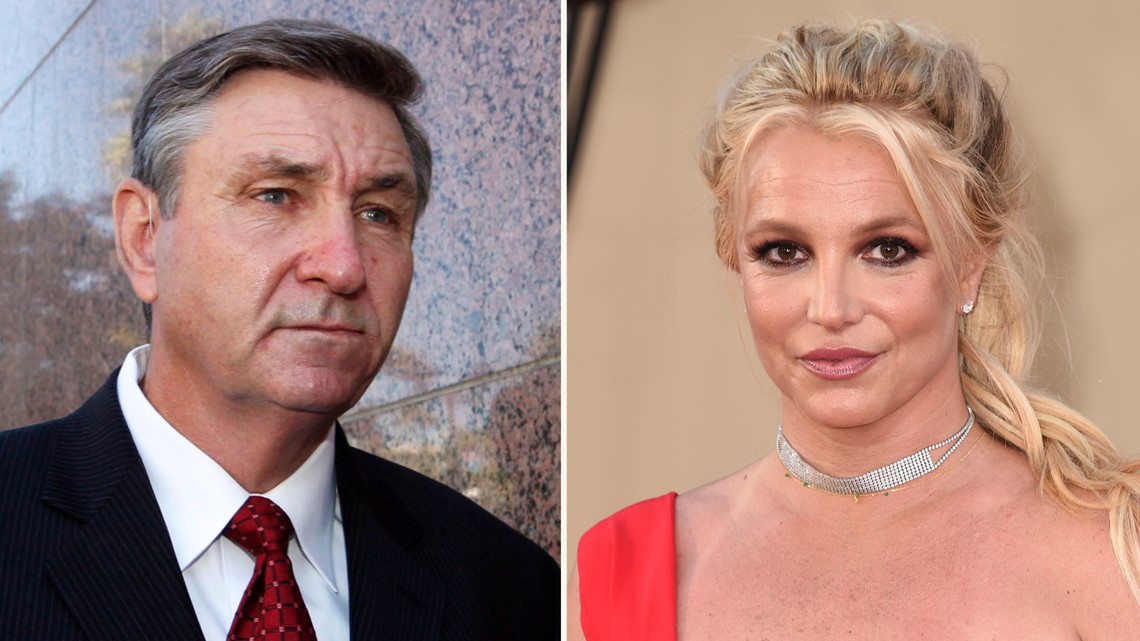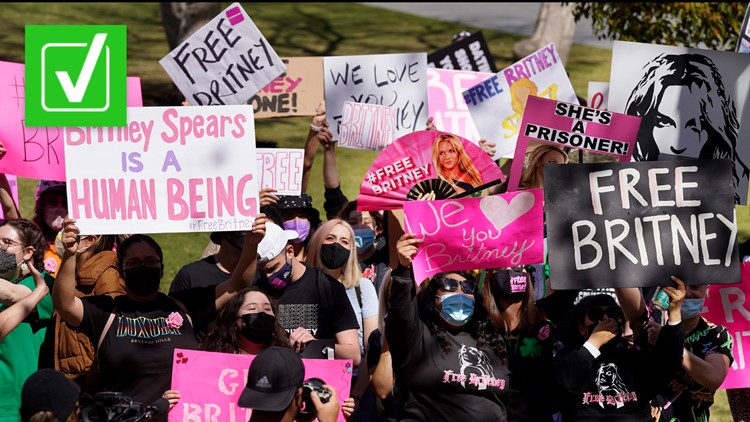WASHINGTON — UPDATE NOV. 12, 2021:
A Los Angeles County Superior Court judge has ended Britney Spears' conservatorship.
Original story from Oct. 8, 2021:
Pop legend Britney Spears’ conservatorship and the #FreeBritney movement, along with documentaries on Netflix and Hulu, have prompted questions across social media about the controversial legal agreement.
On September 29, the judge overseeing Spears’ case, Penny Garland, suspended her father Jamie from his role in the process, approving Spears’ choice for a certified accountant to oversee her finances. In November, a hearing will take place to determine whether Spears’ conservatorship will be terminated.
A conservatorship, which is sometimes called a guardianship, is a legal arrangement set in place after a judge determines someone is unable to take care of their finances or health. The judge appoints a third party, which is usually a family member or friend, to help oversee and take care of those matters. Some conservatorships are temporary and end after a certain period. Others are permanent.
Part of what makes conservatorships tricky to understand is that the definition can change from state to state. Beyond high-profile celebrities like Britney Spears, conservatorships impact everyday citizens, primarily the elderly and those with significant medical conditions.
The VERIFY team answered five questions about conservatorships.
QUESTION 1:
Does the United States track the number of conservatorships?
THE SOURCES
- Diane Robinson, senior court research associate at the National Center for State Courts
- Naomi Cahn, professor of law at the University of Virginia
- Government Accountability Office (GAO)
THE ANSWER
No, the United States does not track the number of conservatorships nationwide.
WHAT WE FOUND
There is no federal database that tracks the number of conservatorships and guardianships in the United States. Naomi Cahn, professor of law at the University of Virginia, said the federal government does not mandate states to report how many conservatorships there are. Experts and groups researching conservatorships say some states can provide reliable data about conservatorships, while others cannot.
The National Center for State Courts (NCSC), a nonprofit focused on improving judicial administration, said it estimated in 2016 that there were about 1.3 million adult guardianship or conservatorship cases in the U.S. that totaled at least $50 billion in assets. The group said that estimate was a projection based on data given from nearly one-third of U.S. states.
Because the definition of what goes into a conservatorship can vary state-by-state, so can the data. Some exist only at the county level for states, making it difficult to know just how many conservatorships exist on a wide scale for the state, let alone for the U.S.
The lack of information on the total number of conservatorships has been documented for more than a decade. A 2010 report from the Government Accountability Office (GAO), a nonpartisan congressional watchdog, found there isn’t a group that tracks how many conservatorships there are in the U.S.
QUESTION 2: Is there only one type of conservatorship?
THE SOURCES
- Federal Housing Finance Agency: Conservatorship Rights Summary
- Diane Robinson, senior court research associate at the National Center for State Courts
- Naomi Cahn, professor of law at the University of Virginia
THE ANSWER
No, there is not only one type of conservatorship.
WHAT WE FOUND
Not all conservatorships are the same, and not all are called conservatorships. There are two terms that are sometimes used interchangeably: conservatorship and guardianship, depending on what state you're in.
"Typically, when we talk about guardianships, we're talking about personal decisions, things like where to live medical care, issues like that," Diane Robinson, a senior court research associate at the National Center for State Courts said.
Naomi Cahn, a law professor at the University of Virginia, agrees with Robinson.
“There’s also conservatorship of the person which relates to things like medical decisions, and then there's conservatorship of the estate, which relates to financial decision making,” Cahn said. “But an individual can be subject to both or can be subject to just one or the other.”
Some reasons to petition for a conservatorship include older adults and the elderly who have memory problems like dementia or health issues that limit their everyday functions. Young adults can also be subjected to conservatorships, such as in issues of severe mental illness or severe substance abuse disorder. It can also be for someone who has an intellectual disability.
There are also temporary or limited conservatorships, mostly used on a case-by-case basis. Robinson said legal teams typically prefer limited guardianships or conservatorships to focus in on areas where someone might be having difficulty and assess later.
"A limited guardianship or conservatorship is preferred over a full guardianship where it really just focuses in on those areas where the person may have difficulty," Robinson said. "There are other ways, for example, supportive decision making, that's preferred to guardianship because the person doesn't lose their rights with that. If someone needs a guardianship or conservatorship, it can be as you said, just on a temporary basis, or it could be on a long term or permanent basis."
While they might be labeled under different names, they have the same mission: to protect the conservatee.
"Both guardianships and conservatorships are basically, at the most fundamental level, to protect someone who may be vulnerable for one reason or another," Robinson said.


QUESTION 3: Can someone in a conservatorship do anything to end it on their own?
THE SOURCES
- Federal Housing Finance Agency: Conservatorship Rights Summary
- Diane Robinson, senior court research associate at the National Center for State Courts
- Naomi Cahn professor of law at the University of Virginia
THE ANSWER
Yes, someone in a conservatorship can take steps to end the conservatorship, although a judge makes the final decision.
WHAT WE FOUND
If someone under a conservatorship does become able to handle their own affairs, then someone close to the case or directly involved would need to go to a court and have it dissolved. The next steps would include an investigator from the court looking into the case and reporting their findings back to the judge, and the judge would ultimately make the final call.
Even if a conservatee isn't able to handle their own affairs, a judge can also remove the conservator if there is proof they aren't fulfilling their duties and terminate the conservatorship altogether.
That's a similar angle that Britney Spears' legal team is trying to prove to Los Angeles Superior Court Judge Brenda Penny — that her father, Jamie Spears, did not fulfill his proper duties as her conservator.
Judge Penny suspended Jamie's role on Sept. 30 and approved Britney’s choice for a certified accountant to oversee her finances. The next hearing will be on Nov. 12, where the full termination of Britney’s conservatorship will be discussed.
While those in the conservatorship can't end it directly on their own, experts say they can file a petition to end the arrangement. Diane Robinson from the National Center for State Courts said a capacity assessment or mental evaluation is typically performed to gauge the next steps.
QUESTION FOUR: Do some states have regulations to monitor conservatorships?
THE SOURCES
- 2019 Summary Review of Adult Guardianship In the United States, American Bar Association
- Naomi Cahn, professor of law at the University of Virginia
- Texas State Courts Guardianship Training Overview
- The Supreme Court of Pennsylvania, Guardianship overview
- Diane Robinson, senior court research associate at the National Center for State Courts
THE ANSWER
Yes, some states have implemented more ways to monitor conservatorships, such as requiring periodic reporting to the court and creating databases online where people can track current cases.
WHAT WE FOUND
Robinson pointed to Pennsylvania as a state that has an online database anyone can access, as well as Texas, which does audits monitoring how many open guardianships are in the state and which are active. All states require reports to the court that's overseeing the conservatorship, but some differ on how often - some are every year, some are every three, some every five.
According to a 2019 review summary of adult guardianship legislation by the American Bar Association, states have enacted a total of approximately 328 adult guardianship bills, which range from minor changes to total revamps in addressing abuse.
The summary also lists Indiana, North Dakota, Nevada and Rhode Island as the most recent of states since 2015 that have made new legal decision-making agreements enforcing guardianship changes. But "the acts are not uniform; provisions such as governing who may serve as a supporter, the scope of the supporter’s duties, and indemnification of third parties vary among the state statutes," the summary says. Like we mentioned earlier, tracking individual state's resources is difficult without uniform data.
Another challenge is giving all courts the same amount of resources dedicated to sorting through the many conservatorship applications, and devoting the amount of time needed for such personal cases. Both Cahn and Robinson said the lack of mandatory reporting guidelines on a national level makes reform difficult but needed.
“There's no mandatory reporting in all of the states,” Cahn said. “There is no mandatory reporting to the federal government on the number of conservatorships that have been entered into, and so that is something that could be done through legislation - requiring states to do this and have a database with all of this, so we can see all this data together.”
"That's something that is sometimes a challenge in courts, having the resources and the staff knowledgeable and having enough staff to do it, and then having staff with the right knowledge and experience to be able to read, read and review those reports," Robinson said.
QUESTION FIVE:
Is Britney Spears the only high-profile celebrity to undergo conservatorship?
THE SOURCES
- Los Angeles Superior Court / Ventura County Superior Court filings
- Superior Court of California, County of Santa Clara limited conservatorship explainer
- California State Courts: “Conservatorships Overview”
THE ANSWER
No, other high-profile celebrities have been controlled by conservatorships.
WHAT WE FOUND
While Britney's case and the resulting #FreeBritney movement brought momentum to the legal battles conservators face, she's not the only celebrity to undergo the process.
A current example is actress Amanda Bynes, known for The Amanda Show and her work in movies like She's All That and Easy A. After being diagnosed with bipolar and manic depressive disorder, Bynes conservatorship began in 2014 when her mother, Lynne Bynes, was named her guardian. In 2018, her conservatorship was renewed for two more years.
Disc Jockey Casey Kasem, who suffered from Parkinson's disease, also was placed under a conservatorship. A judge reversed the original conservatorship, which granted his wife Jean as a guardian, in May 2014 to his daughter Kerri Kesem after years of his children seeking charges for elder abuse from Jean. Casey passed away on June 15, 2014.
Other celebrities include The Eagles’ Randy Meisner, who was placed under a temporary conservatorship that he requested himself following the death of his wife in 2016, and actor Mickey Rooney in 2011.













